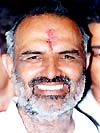
The Rediff Interview/ Sahib Singh Verma
'I have sacrificed the chief ministership because
I am a loyal party worker. I am not remorseful.
But seeing my supporters cry makes me also cry'
 Two weeks after his removal from the post of Delhi's chief minister, Sahib Singh Verma is still angry. He is angry that the Bharatiya Janata Party leadership refused to recognise his ''sterling performance'' as the capital's executive head. He is angry that Delhiites blamed him for the rising crime rate and high prices of onions.
Two weeks after his removal from the post of Delhi's chief minister, Sahib Singh Verma is still angry. He is angry that the Bharatiya Janata Party leadership refused to recognise his ''sterling performance'' as the capital's executive head. He is angry that Delhiites blamed him for the rising crime rate and high prices of onions.
But the ousted chief minister is not fuming alone. Every day, hundreds of his supporters -- mainly Jats -- turn up in front of his modest two-room flat in West Delhi's Shalimar Bagh to share what Verma says is "my greatest agony since I joined politics".
"I have sacrificed the chief ministership because I am a loyal party worker. I am not remorseful. But seeing my supporters cry before me makes me also cry," he says.
Sensing that there is a groundswell of support for Verma in Delhi's rural constituencies, Prime Minister Atal Bihari Vajpayee offered to induct him in the Union Cabinet. But Verma has refused the offer for the moment, stating that he will work for the party's success in the assembly election in Delhi next month.
His opponents in the Delhi unit of the BJP led by Parliamentary Affairs Minister Madan Lal Khurana claim that Verma has been "cut to size". But senior party leaders are worried, for they know that this librarian-turned-politician with mass rural support can make or mar the party's chances in Delhi.
That is why, early every morning, Verma has an unusual visitor: his successor Sushma Swaraj. "She comes to me every day for political counsel and to chalk out our election strategy," claims Verma.
In this exclusive interview with George Iype, Verma explains what prompted the BJP leadership to axe him and how he will fight back.
What do you think forced the party leadership to remove you so unceremoniously just 40 days before the election?
The party leadership did not remove me as chief minister. I stepped down voluntarily. I was never told by the leadership that my performance as chief minister was not up to the mark and therefore I should resign.
But what reasons did the senior party leaders cite that compelled you to resign?
Mainly, they (the senior party leaders) were talking of law-and-order problems and the high prices of onions. But I explained to them that law and order and onions have nothing to do with me as chief minister. Controlling rising crimes in the city was not my area because the police in Delhi is managed by the central government. So was the case with onion prices. It was the bad crop that resulted in the skyrocketing of onion prices.
The problem lies in the fact that Delhi is still not a full-fledged state. The Delhi government has little powers, but I used to take the blame for everything that went wrong in the city. But I could not raise my voice against our own central government when major tragedies like the dropsy deaths occurred in the past six months.
Didn't you argue with the party leadership that since you had performed well as chief minister, there was no sense in removing you?
I told the party leadership not to blame me for bad governance because I feel my performance as chief minister was sterling. But somehow the party leadership felt that a change of leadership should be effected to change the mood of the people because the elections are coming. There is no other reason for my sacrifice.
You mean to say the party could have won Delhi comfortably with you as chief minister?
The party would have won by a huge margin if I had been allowed to lead it in the election. There was no question of the BJP taking defeat under me in Delhi. But a section of the leadership felt that in Delhi we would probably get less seats if I remained chief minister. They argued with the high command not to take a risk.
So what mattered was not your performance, but the factionalism in the Delhi BJP.
The BJP is not banking on my performance alone. There are many other factors that matter during the election. As chief minister I have achieved what Delhi could not achieve in the last 50 years. When we came to power in 1993, only 1,600 megawatts of electricity were being supplied to Delhi. But in the last two years I have ensured that 2,400 megawatts are being supplied to Delhi every day. I created a system that works in the city.
But trouble begins when every Delhiite begins to expect that the chief minister should solve all their problems.
Sahib Singh Verma interview continues
|



